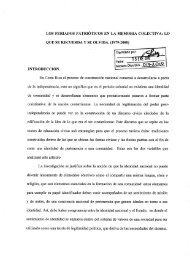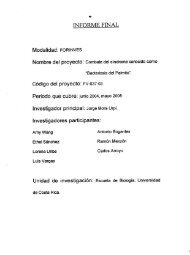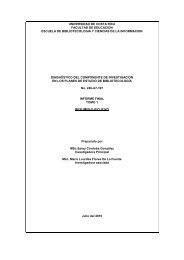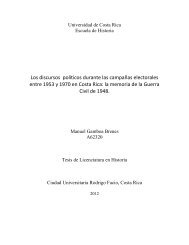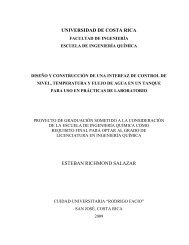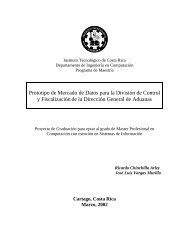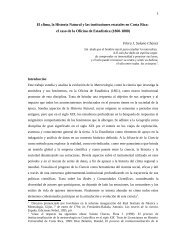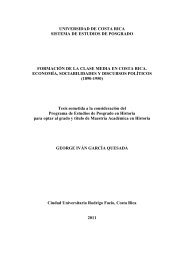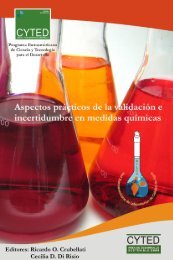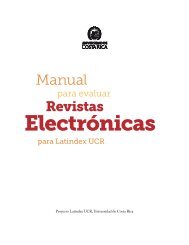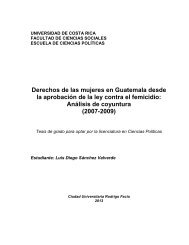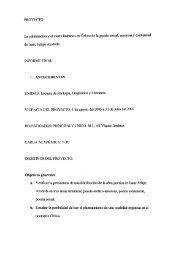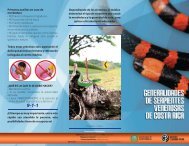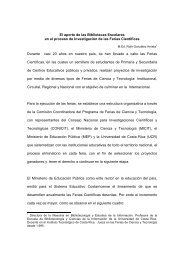A Raisin in the Sun
A Raisin in the Sun
A Raisin in the Sun
You also want an ePaper? Increase the reach of your titles
YUMPU automatically turns print PDFs into web optimized ePapers that Google loves.
does not take Lena's criticism about <strong>the</strong> way Ruth takes care of Travis, Ruth's son:<br />
Mama: [. . .] What you fix for his breakfast this morn<strong>in</strong>g?<br />
Ruth: (Angrily) I feed my son, Lena!<br />
Mama: I a<strong>in</strong>'t meddl<strong>in</strong>g –(Underbreath, busy-bodyish) I just noticed all last week he had cold cereal.<br />
[. . .]<br />
Ruth: (Furious) I gave him hot oats –is that all right! (Hansberry, 1988: 40-41).<br />
Although Lena makes <strong>the</strong> decisions <strong>in</strong> <strong>the</strong> Younger family and Ruth respects her authority, <strong>the</strong> fact<br />
that Ruth confronts Lena's criticism openly reveals a more leveled power relationship between <strong>the</strong> two<br />
women. Ruth is not afraid to defend herself and does not take Lena's criticism sheepishly, which causes<br />
Lena to shift <strong>the</strong> conversation subject and partner. This reveals a shift <strong>in</strong> <strong>the</strong> power structure plac<strong>in</strong>g Ruth<br />
above Lena herself. Ruth is not a powerless housewife, but an empowered woman that is able to confront<br />
even <strong>the</strong> head of <strong>the</strong> family.<br />
Ruth's powerlessness becomes destabilized from a Derridean perspective of her behavior. While<br />
b<strong>in</strong>ary opposites portray Ruth as <strong>the</strong> lowest <strong>in</strong> <strong>the</strong> power hierarchy of <strong>the</strong> Younger women, <strong>the</strong> way Ruth<br />
relates to Beneatha and to Lena challenges this position. Ruth sometimes appears to be <strong>in</strong> <strong>the</strong> same level of<br />
Beneatha and Lena. In o<strong>the</strong>r occasions, Ruth appears to be even above Beneatha or Lena. This highlights<br />
<strong>the</strong> idea that power is not a fixed, hierarchical structure of <strong>the</strong> women <strong>in</strong> A <strong>Rais<strong>in</strong></strong> <strong>in</strong> <strong>the</strong> <strong>Sun</strong>.<br />
BENEATHA YOUNGER: THE EMPOWERED WOMAN?<br />
On a surface level, Beneatha Younger appears to be <strong>the</strong> most liberated and empowered woman <strong>in</strong><br />
A <strong>Rais<strong>in</strong></strong> <strong>in</strong> <strong>the</strong> <strong>Sun</strong>. Aga<strong>in</strong>, this is based on a traditional analysis of b<strong>in</strong>ary opposites re<strong>in</strong>forced by <strong>the</strong><br />
constructs of presence and absence to which Derrida objects. For example, <strong>the</strong> existence –or presence– of<br />
education <strong>in</strong> Beneatha as a person becomes mean<strong>in</strong>gful because education is absent <strong>in</strong> <strong>the</strong> rest of <strong>the</strong><br />
Youngers. Similarly, Beneatha wants to become an <strong>in</strong>dividual of her own while <strong>the</strong> o<strong>the</strong>r women <strong>in</strong> <strong>the</strong><br />
family apparently live accord<strong>in</strong>g to patriarchal premises. This places Beneatha <strong>in</strong> <strong>the</strong> position of an<br />
awakened woman and suggests that she could be above <strong>the</strong> rest of <strong>the</strong> family <strong>in</strong> terms of power: she has a<br />
voice of her own. On a deeper level, however, Beneatha does not seem an empowered woman: she resorts<br />
to oppressive discourse to ga<strong>in</strong> access and becomes <strong>the</strong> powerless one <strong>in</strong> <strong>the</strong> family.<br />
For Marilyn Frye, power and access to resources are deeply <strong>in</strong>tertw<strong>in</strong>ed: “total power is<br />
unconditional access; total powerlessness is be<strong>in</strong>g unconditionally accessible. The creation and<br />
Saravia Vargas, José Roberto. "From Power-over to Power-to: Power Relations of Women <strong>in</strong> Hansberry's A <strong>Rais<strong>in</strong></strong> <strong>in</strong> <strong>the</strong> <strong>Sun</strong>"<br />
Impossibilia Nº4, Págs. 34-51 (Octubre 2012) Artículo: Recibido 08/02/2012 - Aceptado 20/03/2012 - Publicado 30/10/2012<br />
45



